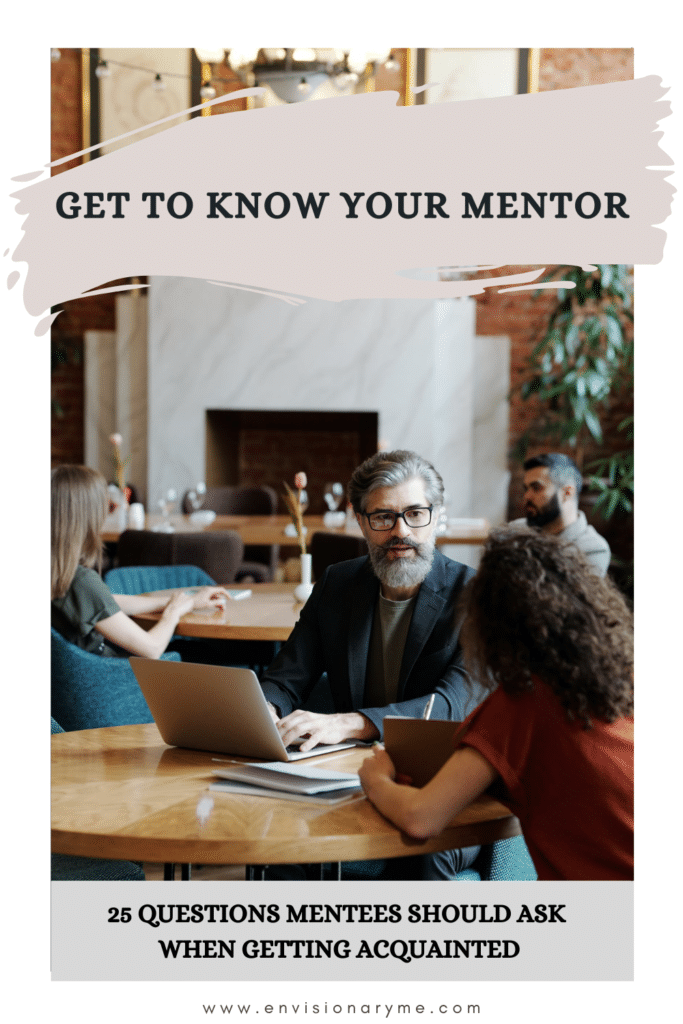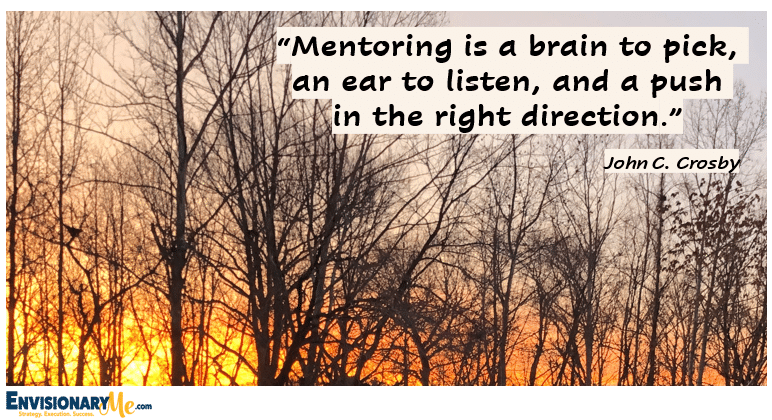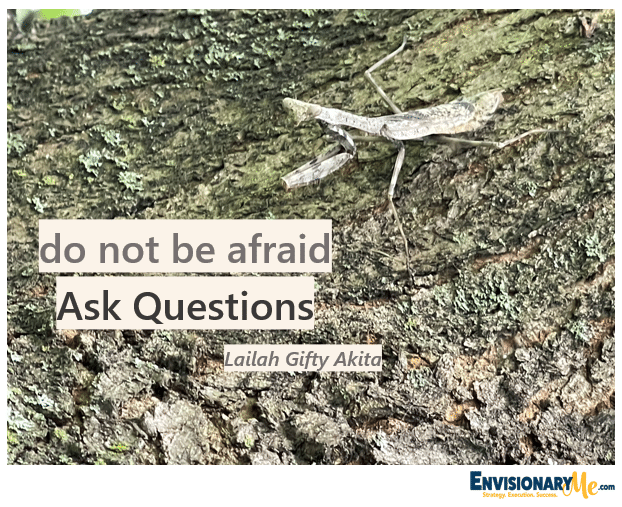Start your mentorship off on a positive note using this list of questions to ask your mentor. You will build a successful mentoring relationship by getting to know each other and sharing mutual goals and expectations. Your relationship with your mentor begins day 1, and it helps to have a list of questions ready for your first meeting. A strong mentoring partnership begins by asking these questions, and a good mentor will look forward to the discussion!

Getting acquainted is an important part of the mentoring process. Don’t overlook the need to talk and get to know each other’s style and expectations for your mentorship program. Taking this time by meeting virtually or in person allows you to put together a mentoring plan that works for both of you.
There are no specific rules about getting to know your mentor, but it’s a more formal relationship, so try to maximize your time together. This meeting sets you up for a successful relationship; this conversation breaks the ice and leads to learning more about how your mentor can help with your professional growth, advice your mentor can provide, and conversation about other areas where you may value their input.
If you have already selected your mentor and the pairing is official, you know they share all or most of the following leadership qualities and traits.
Mentors in a successful mentoring program possess:
· The necessary skillset and knowledge
· Available time
· A willingness to commit that time
Good mentors also share the following traits:
· Good listener
· Nonjudgmental
· Value diversity
· Empathetic
· Resourceful
· Trustworthy
· Willingness to act as a sounding board
· Flexible communicator
· Creative problem solver
· Willingness to offer perspective
· Ability to offer guidance and constructive criticism
It’s a balance. Mentors aren’t hired trainers. They are offering their time and actively want to support mentees on their path to success. Schedules and priorities change though, so do make sure they are still committed, willing, and able to follow through.
Understand that a mentor’s skillset alone is not all you need to reach your goals. The right mentor for you might not be in your field of interest or have certain on the job experience, but may still be someone you might like to learn from. Experience is key for some mentorships, but not most. What you are looking for is coaching and motivation. Someone you admire with the right skillset or for possessing the qualities of a great mentor may be the right fit. Be open. Your mentorship is a journey, and you will grow through the process.

Communication skills matter! Always consider what you need and what type of partnership will help you reach your goal. Knowing how you learn, considering your specific situation, and how you can (and will!) hold yourself accountable makes a big difference.
For example, a traditional one on one mentorship is quite different than a flash mentorship. A mentor with skill but lacking empathy, not valuing your perspective, or with an unwillingness to follow through according to a necessary timeline would be difficult to work with in a traditional mentorship, and the process may be painful for you.
Ask your mentor! They’ll agree:
Good communication skills are essential to the success of your mentoring relationship!
But suppose that same person really does have the knowledge and the willingness to share with you. Perhaps they have the intellectual capabilities but do not possess the people skills. In such a case, a flash mentorship or working together utilizing a brief, situational mentorship might be perfect.
As you get acquainted, build upon the search that brought you together, to set up a process that is likely to lead to a successful conclusion. Neither of you has time to waste. Neither of you need frustrations added into your day!
The success of even the most well thought out program comes down to the mentor-mentee relationship and how the plan is executed.
Often there is a fondness or camaraderie that develops from the trust built and the interactions that take place between a mentor and mentee, but that isn’t always so – and it is not necessary to the success of the program. Your mentor could be the kindest or the most skilled person in their field, but if they do not follow through with helping you as agreed, the program is not a win.
Likewise, a mentee who doesn’t follow through on their end or has unreasonable expectations of the mentor, will miss out on great learning and support.
After agreeing to the partnership, getting better acquainted is an important part of the mentoring process. Don’t overlook the need to talk and get to know more about each other’s style and expectations for the program. Taking this time over the telephone, or by meeting virtually or in person, allows you to put together a mentoring plan that works for both of you.

Get acquainted! A great way to begin your mentoring relationship is to literally get acquainted by asking questions. Yes – seriously!
The more your mentor knows, the more they can help you. The more you know about each other, the more likely you are to build trust and camaraderie right away.
Getting acquainted before diving into creating a plan and goal setting, allows you and your mentor the opportunity to prepare. You’ll have questions, and they’ll want to know about your career progression, your desired path, and your strengths and weaknesses too. This conversation helps you set up for creating your plan, and it also helps your mentor consider gaps they can help fill to help you achieve your goals.
Start by asking them to tell you about their professional journey.
QUESTIONS TO ASK A MENTOR
Your Getting Acquainted Conversation might include some, or all, of these 25 questions:
1. What helped you to become successful?
2. Why did you choose this path?
3. If you were able to do it all over again, what would you do differently?
4. What was your first job out of college and how did you get it
5. Did you start out knowing you were on the right track?
6. If not, what did you change, or did you determine your path?
7. At what point did you know it was time to move on or take that the next step?
8. Did you ever feel like giving up because there were too many hurdles?
9. What aspects of your job are the most rewarding?
10. What aspects of your job do you enjoy the most?
11. What parts of your job take the most time?
12. How do you prioritize?
13. What do you like most or find most interesting about your work?
14. What do you like least about your job?
15. What kinds of problems do you face? What do you find most difficult?
16. What skills and abilities are most important in your work?
17. How did you become highly skilled in areas that needed improvement?
18. What does a typical workday look like for you?
19. Is this your dream job? If not, what would be your dream job?
20. How do you balance work with your personal life on a daily basis?
21. What trade-offs did you make, if any, in balancing work and family as your career developed?
22. What are your hobbies, outside interests, volunteer activities, etc.?
23. What would you do with 15 minutes of fame?
24. What’s the best piece of advice you were ever given?
25. Now that we’ve met, what’s your first piece of advice for me?
You and your mentor may want to share some personal details, which may help when determining activities to support your mentorship goals, and may encourage camaraderie, but that depends upon your mutual comfort level.
Getting acquainted is a casual conversation. It’s nothing to stress about!
Why asking good questions is important to your mentorship

Whether you are starting your first job, making a change, or have been in the workforce for a long period of time and are interested in strengthening a new skill, you will still get acquainted with your mentor, and the goals of the conversation are the same.
You can find a mentor coming from all walks of life! You may find the right person to be your mentor in your current role, while working on a new project – or even on LinkedIn! Be open!
- Words from Ryan, a 23-year-old mentor, selected at age 22 to perform as a mentor in a formal corporate mentoring program: “People tell me I’m a great mentor. I guess some of it came naturally, and I think helping people is just in my nature. They come to me and ask, even outside or work, about reaching health goals and how to manage certain situations. I use wisdom I got from my mom mostly, and some from previous mentors and experiences in my own life.”
Ryan was selected by his managers to be a mentor at age 22. He acted as a trainer, as a first level manager, and progressed into peer to peer mentoring, and kept going from there.
You are realizing there is no face, age or resume that describes your perfect mentor – and you are correct.
Each mentoring process is unique to your needs and situation. Mentorships can be set up to conform and adjust as needed, to help support you in reaching your objective. Your perfect mentor may be a business professional, an empty nester who managed an extremely busy household with 5 kids with excellence, a teacher specializing in virtual learning, a college alumnus in the same field, a peer from a neighboring department, an online mentoring professional, or simply a friend with the knowledge and skillset desired.
Shape a mentorship that fits you. Use our questions or create open ended questions of your own – and get to know your mentor. Share back & be open to their feedback! You are on your way!

0 Comments